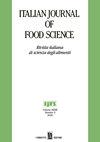Exploring immuno-genetic resistance in pigs to the food-borne zoonotic pathogen, Toxoplasma gondii
IF 3.6
4区 农林科学
Q2 FOOD SCIENCE & TECHNOLOGY
引用次数: 0
Abstract
Toxoplasmosis is a re-emerging food-borne zoonosis of warm-blooded animals caused by Toxoplasma gondii, an obligate intracellular parasite with a complex biological cycle. Until now, the genotypic approach for discovering putative resistance immuno-genetic markers has never been adopted for T. gondii infection. Thus, this study aimed, for the first time, to deepen these novel insights. In particular, pigs, reared in different farms in Central Italy, were phenotypically characterized by serological assays performed on diaphragm meat juice. Out of 179 tested animals, 98 resulted seropositive (54.74%), 57 seronegative (31.84%), and 24 doubtful (13.40%), underlining a possible re-emerging diffusion of this protozoan in the investigated areas. Contextually, an RT-PCR assay, followed by Sanger sequencing for IL-18, a pro-inflammatory cytokine with a key role upstream of the infection, was developed. At this stage, for this interleukin, significant polymorphic variations were not detected compared to the reference sequence, except in a seropositive animal. However, the starting outcomes of this novel and preliminary study will be investigated in depth with different approaches also on other target genes, with a crucial activity in the immunity pathway towards T. gondii, to unveil the possible presence of resistance genetic mechanisms and, finally, to make pork derived food safer.探索猪对食源性人畜共患病原体弓形虫的免疫遗传抗性
弓形虫病是由弓形虫(Toxoplasma gondii)引起的温血动物食源性人畜共患病,弓形虫是一种细胞内寄生虫,具有复杂的生物循环。迄今为止,人们还从未采用基因型方法来发现冈地弓形虫感染的潜在抗性免疫遗传标记。因此,本研究旨在首次深化这些新见解。特别是,在意大利中部不同农场饲养的猪,通过对膈肌肉汁进行血清学检测来确定其表型特征。在 179 头接受检测的动物中,98 头血清阳性(占 54.74%),57 头血清阴性(占 31.84%),24 头可疑(占 13.40%)。在此背景下,开发了一种 RT-PCR 检测方法,随后对 IL-18 进行了 Sanger 测序,IL-18 是一种促炎细胞因子,在感染上游起着关键作用。在这一阶段,与参考序列相比,这种白细胞介素没有发现明显的多态性变异,只有一只血清反应呈阳性的动物除外。不过,这项新颖而初步的研究成果还将通过不同的方法对其他目标基因进行深入研究,这些基因在对淋球菌的免疫途径中具有关键作用,以揭示可能存在的抗性遗传机制,最终使猪肉食品更加安全。
本文章由计算机程序翻译,如有差异,请以英文原文为准。
求助全文
约1分钟内获得全文
求助全文
来源期刊

Italian Journal of Food Science
工程技术-食品科技
CiteScore
4.20
自引率
0.00%
发文量
33
审稿时长
>36 weeks
期刊介绍:
"Italian Journal of Food Science" is an international journal publishing original, basic and applied papers, reviews, short communications, surveys and opinions on food science and technology with specific reference to the Mediterranean Region. Its expanded scope includes food production, food engineering, food management, food quality, shelf-life, consumer acceptance of foodstuffs, food safety and nutrition, energy and environmental aspects of food processing on the whole life cycle.
Reviews and surveys on specific topics relevant to the advance of the Mediterranean food industry are particularly welcome.
 求助内容:
求助内容: 应助结果提醒方式:
应助结果提醒方式:


